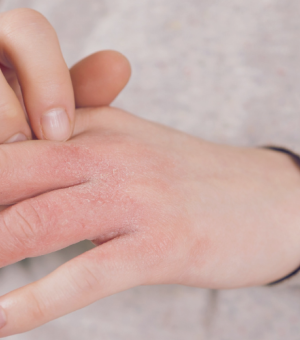Tuesday, February 22, 2022
About psoriasis
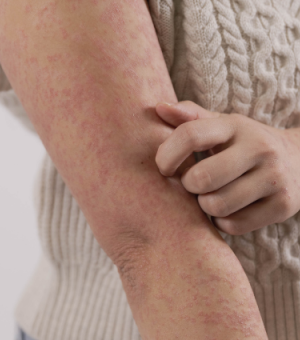
Put your skin first
Psoriasis develops when there is a dysfunction of the immune system that causes inflammation. Although signs can appear anywhere on the body, the most common areas include elbows, knees, scalp, chest and lower back.
Triggers for psoriasis can lead to an active outbreak of the disease or even its onset. These factors include stress, injury to a specific skin area, systemic infections, and the use of certain medications.
People with psoriasis may experience physical pain, discomfort and bleeding that disrupt daily activities. This can cause depression, anxiety, low self-esteem, poor self-image and feelings of loneliness.
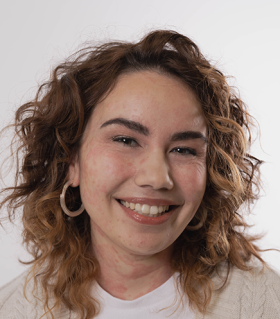
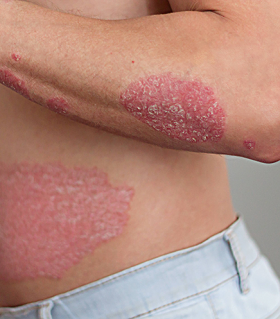
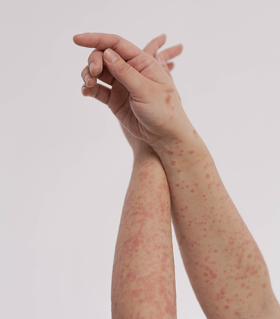
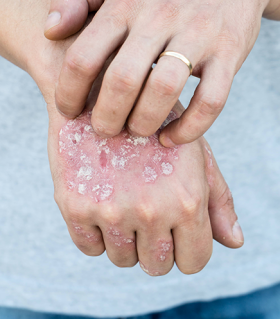
There are five main types of psoriasis:
Plaque psoriasis (also known as psoriasis vulgaris) is the most common type of psoriasis, affecting about 90% of patients.
It appears as patches of inflamed skin, covered by an accumulation of skin cells that form a white, scaly layer called a squama.
Plaque psoriasis can develop on any part of the body, but most often occurs on the elbows, knees, scalp and trunk.
Guttate psoriasis comes from the Latin word gutta, which means "drop".
This form of psoriasis is characterised by small red, scaly patches of skin that often look like tears or raindrops. Hundreds of these small, drop-shaped patches can appear on the arms, legs, chest and sometimes the scalp. It usually affects children and young adults.
It is estimated that 21-30% of people with psoriasis suffer from inverted psoriasis (also called intertriginous psoriasis or flexural psoriasis). It occurs in areas such as the armpits, groin, under the breasts or buttocks, or any other area where the skin folds or bends. This type of psoriasis is characterised by smooth, inflamed lesions and may be moist to the touch. Inverse psoriasis lacks the scaling associated with plaque psoriasis due to the moist environment.
Pustular psoriasis is described as blister-like lesions filled with non-infectious pus and surrounded by reddened skin. It is a rare but severe type of psoriasis, usually seen in adults and often requiring immediate medical attention.
There are three different forms of pustular psoriasis: generalised, localised and acropustulosis.
Erythrodermic psoriasis is the rarest form of psoriasis, but also the most severe. It is estimated to affect 1-2% of people with psoriasis and is described as a skin-like rash over the entire body. It can cause intense itching or burning and usually spreads rapidly.
With proper treatment, you can better manage your skin problems and enjoy a better quality of life.
Topical treatments
Different types of creams are applied regularly to the plaques until they disappear.
Other treatments
No systemic or phototherapy treatments can be prescribed.
According to the severity of your psoriasis, many options are available. Our dermatology team will recommend the best treatment for your condition.
Although there is no cure for psoriasis, a wide range of treatments are available to help control the disease. Generally, treatments fall into three categories: topical treatments, phototherapy and systemic treatments.
The choice of the most appropriate type of treatment depends on the form and severity of the disease, the size and extent of the plaques, the patient's response to a given treatment and the patient's preferences.
The doctor may change the dose of a patient's treatment, combine one type of treatment with another, or switch treatments to find one that works better for the patient.
Dermago's online consultation is quick and easy!
No need to wait months to see a dermatologist in person- we can take care of everything online!
To get started, simply answer a few questions and attach a picture of your skin concern.
Once you’ve completed the questionnaire, choose your consultation timeline - get your plan in less than 7 days.
One of our medical experts will get back to you with a treatment plan. Prescriptions are sent directly to your pharmacy.
Treat your condition with dermago!
Starts at $165
To get a diagnosis and prescription treatment for minor conditions or rejuvenation care.
Ideal for skin problems such as acne, rosacea, psoriasis, eczema, hair loss, nail fungus or to treat wrinkles, fine lines and pigmentation spots.
A nurse will handle communication and follow-up with you, while the dermatologist will make your diagnosis and treatment recommendation.
Starts at $299
To get a diagnosis and prescription treatment for all skin conditions, including moles and melanomas.
Ideal for more serious or chronic skin problems.
As of September, you will also be able to book appointments with our dermatologists AT OUR CLINIC.
Start your consultation and then choose the plan that suits you best.
Looking to learn more?
Tuesday, February 22, 2022

Monday, August 8, 2022
Dr. Marc-André Doré
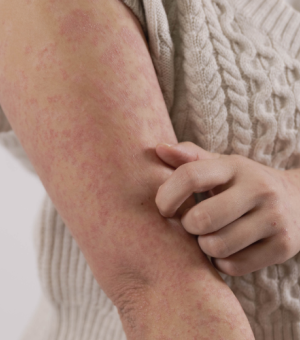
Saturday, August 20, 2022
Dr. Marc-André Doré
